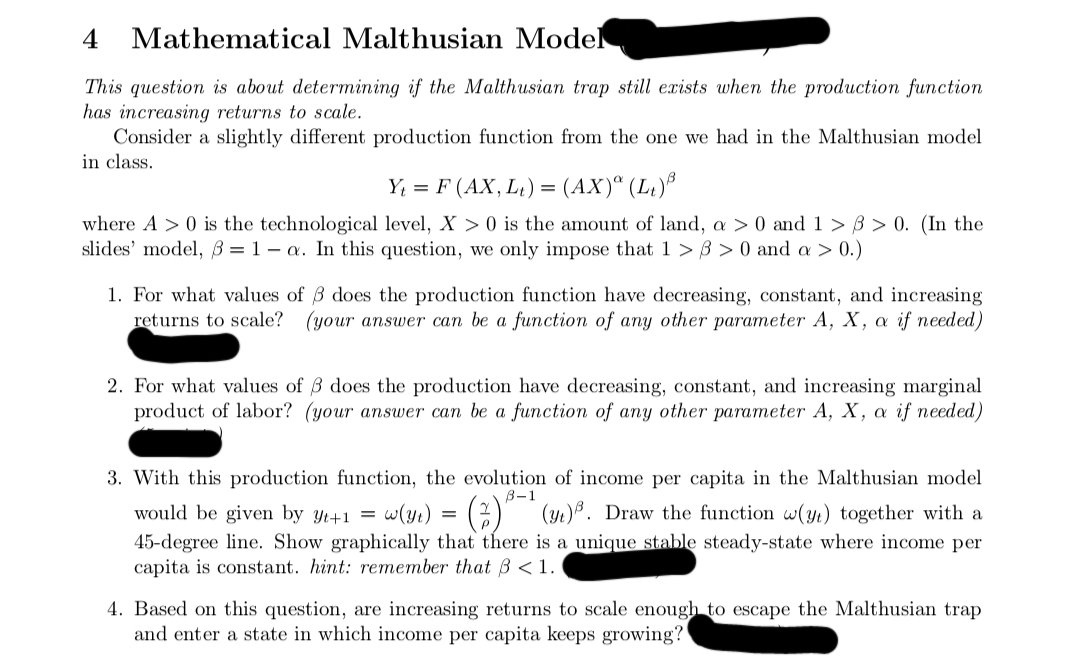4 Mathematical Malthusian Model This question is about determining if the Malthusian trap still exists when the production function has increasing returns to scale. Consider a slightly different production function from the one we had in the Malthusian model in class. Y₁ = F (AX, L₁) = (AX)" (L₁)³ where A> 0 is the technological level, X>0 is the amount of land, a > 0 and 1>3 > 0. (In the slides' model, 3 = 1-a. In this question, we only impose that 1>3> 0 and a > 0.) 1. For what values of 3 does the production function have decreasing, constant, and increasing returns to scale? (your answer can be a function of any other parameter A, X, a if needed)
4 Mathematical Malthusian Model This question is about determining if the Malthusian trap still exists when the production function has increasing returns to scale. Consider a slightly different production function from the one we had in the Malthusian model in class. Y₁ = F (AX, L₁) = (AX)" (L₁)³ where A> 0 is the technological level, X>0 is the amount of land, a > 0 and 1>3 > 0. (In the slides' model, 3 = 1-a. In this question, we only impose that 1>3> 0 and a > 0.) 1. For what values of 3 does the production function have decreasing, constant, and increasing returns to scale? (your answer can be a function of any other parameter A, X, a if needed)
Chapter9: Production Functions
Section: Chapter Questions
Problem 9.2P
Related questions
Question

Transcribed Image Text:4 Mathematical Malthusian Model
This question is about determining if the Malthusian trap still exists when the production function
has increasing returns to scale.
Consider a slightly different production function from the one we had in the Malthusian model
in class.
Y₁ = F (AX, L₁) = (AX)ª (L₁)³
where A> 0 is the technological level, X> 0 is the amount of land, a > 0 and 1 > > 0. (In the
slides' model, 3=1-a. In this question, we only impose that 1>3> 0 and a > 0.)
1. For what values of 3 does the production function have decreasing, constant, and increasing
returns to scale? (your answer can be a function of any other parameter A, X, a if needed)
2. For what values of 3 does the production have decreasing, constant, and increasing marginal
product of labor? (your answer can be a function of any other parameter A, X, a if needed)
3. With this production function, the evolution of income per capita in the Malthusian model
B-1
would be given by yt+1 = w(y₁) = (2)³ (3₁)³. Draw the function w(y) together with a
45-degree line. Show graphically that there is a unique stable steady-state where income per
capita is constant. hint: remember that ß < 1.
4. Based on this question, are increasing returns to scale enough to escape the Malthusian trap
and enter a state in which income per capita keeps growing?
Expert Solution
This question has been solved!
Explore an expertly crafted, step-by-step solution for a thorough understanding of key concepts.
Step by step
Solved in 3 steps with 4 images

Knowledge Booster
Learn more about
Need a deep-dive on the concept behind this application? Look no further. Learn more about this topic, economics and related others by exploring similar questions and additional content below.Recommended textbooks for you


Principles of Economics (MindTap Course List)
Economics
ISBN:
9781305585126
Author:
N. Gregory Mankiw
Publisher:
Cengage Learning

Principles of Microeconomics (MindTap Course List)
Economics
ISBN:
9781305971493
Author:
N. Gregory Mankiw
Publisher:
Cengage Learning


Principles of Economics (MindTap Course List)
Economics
ISBN:
9781305585126
Author:
N. Gregory Mankiw
Publisher:
Cengage Learning

Principles of Microeconomics (MindTap Course List)
Economics
ISBN:
9781305971493
Author:
N. Gregory Mankiw
Publisher:
Cengage Learning